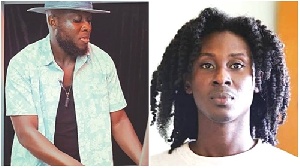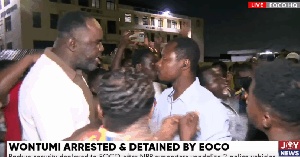- Home - Entertainment
- Lifestyle News
- Year In Review
- Music News
- Entertainers
- Entertainment Archive
- Entertainment Photos
- Jokes
- Entertainment Headlines
- Ameyaw Debrah
- Brown GH
- Celebrities Buzz
- GH Base
- Ghana Celebrities
- Gh Gossip
- GH Page
- GH Splash
- Hot Gossip GH
- YEN
LifeStyle of Monday, 12 May 2025
Source: www.ghanawebbers.com
US Embassy celebrates Ghanaian culture, jazz music
The event took place at the U.S. Embassy in Cantonments, Accra. Its goal was to promote jazz and poetry appreciation. The theme was “Jazz Appreciation: The Evolution of Jazz and Poetic Expression in Ghana.” It aimed to show how jazz and spoken word can inspire future generations.
Ghanaian artist Kwame Akoto-Bamfo facilitated the event. He is also the Founder of the Nkyinkyim Museum. Creative Director Isaac Nii Sanku Dromor Dodoo joined him as a facilitator. The museum focuses on visually archiving African history and heritage.
Attendees included members from various organizations, such as the American Centre Patrons and the U.S. Embassy. Students from UniMAC Institute of Film and Television were present too. Personnel from the Ghana Immigration Service (GIS) and Customs Division of GRA attended as well.
Performances featured poetry by Nii Obido Ayeyetey from the Nkyinkyim Museum. Isaac Nii Sanku Dromor Dodoo presented a jazz performance. American Diplomat Matthew Asada spoke about jazz's cultural significance. He described it as a tool for social change through storytelling, poetry, and music.
Since arriving in Ghana last October, Mr. Asada has attended many literary events. He noted a strong local passion for spoken word poetry, calling it transformative.
Mr. Akoto-Bamfo encouraged local radio stations to include jazz in their programming. He mentioned that many hiplife artists avoid jazz due to its commercial challenges despite its artistic value.
He shared his experience using jazz as a communication tool after moving to Ada for the museum's establishment. “I didn’t know jazz at first,” he said about his initial struggles with communication channels.
He emphasized that research must be shared understandably within communities through oral traditions and music like jazz.
Mr. Akoto-Bamfo explained how they engage communities through music at the museum: “We form a circle, pick a song related to our topic, and sing together.” Participation matters more than vocal talent in this learning process.
Isaac Nii Sanku Dromor Dodoo discussed jazz’s origins in African-American communities in New Orleans. He highlighted its deep roots in African rhythms, hymns, and dance traditions.
He noted Ghana's significant contributions to jazz during Dr. Kwame Nkrumah’s era in the 1960s when many bands played jazz here.
“Ghana became a learning hub for others,” he stated while expressing optimism about jazz's future in Ghana.
He encouraged artists to explore jazz deeply and give it their best effort.











